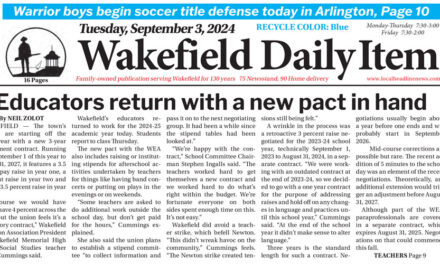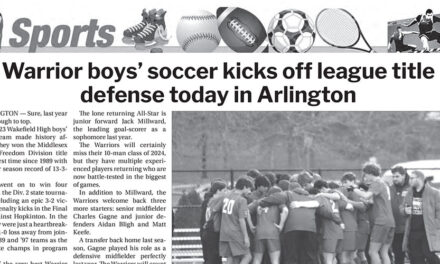By NEIL ZOLOT
WAKEFIELD — The town’s teachers are starting off the school year with a new 3-year employment contract. Running from September 1 of this year to August 31, 2027, it features a 3.5 percent pay raise in year one, a 4 percent raise in year two and another 3.5 percent raise in year three.
“Of course we would have liked to have 4 percent across the board, but the union feels it’s a satisfactory contract,” Wakefield Education Association President and Wakefield Memorial High School Social Studies teacher Jessica Cummings said.
Wakefield’s educators returned to work for the 2024-25 academic year today. Students report to class Thursday.
The new pact with the WEA also includes raising or instituting stipends for afterschool activities undertaken by teachers for things like having band concerts or putting on plays in the evenings or on weekends.
“Some teachers are asked to do additional work outside the school day, but don’t get paid for the hours,” Cummings explained.
She also said the union plans to establish a stipend committee “to collect information and pass it on to the next negotiating group. It had been a while since the stipend tables had been looked at.”
“We’re happy with the contract,” School Committee Chairman Stephen Ingalls said. “The teachers worked hard to get themselves a new contract and we worked hard to do what’s right within the budget. We’re fortunate everyone on both sides spent enough time on this. It’s not easy.”
Wakefield did avoid a teacher strike, which befell Newton. “This didn’t wreak havoc on the community,” Cummings feels. “The Newton strike created tensions still being felt.”
A wrinkle in the process was a retroactive 3 percent raise negotiated for the 2023-24 school year, technically September 1, 2023 to August 31, 2024, in a separate contract. “We were working with an outdated contract at the end of 2023-24, so we decided to go with a one year contract for the purpose of addressing raises and hold off on any changes in language and practices until this school year,” Cummings said. “At the end of the school year it didn’t make sense to alter language.”
Three years is the standard length for such a contract. Negotiations usually begin about a year before one ends and will probably start in September 2026.
Mid-course corrections are possible but rare. The recent addition of 5 minutes to the school day was an element of the recent negotiations. Theoretically, any additional extension would trigger an adjustment before August 31, 2027.
Although part of the WEA, paraprofessionals are covered in a separate contract, which expires August 31, 2025. Negotiations on that could commence this fall.
—————
In other matters, Human Resources Coordinator Joe Belanger briefed the School Committee on a new Position Control system to track teaching assignments, now beginning its second year of use, at their meeting Tuesday, August 6. “It tracks job slots, which allows us to identify all filled and vacant positions,” he said. “It also tracks additions of new employees to the payroll system to positions approved, based on the budget and accurately generate reporting for any personnel. It also keeps a history of every position and employees who have occupied that position.”
He feels this will be a big help for principals looking to fill positions. “From what I’ve heard, they’re spending part of the summer trying to figure out what positions to fill,” he reported. “It can get little confusing, especially positions that move around, often paraprofessional positions that move from one school to another (with a student).”
“If this is engaged, we can move people from position to position and help us react thoughtfully to student needs throughout the district,” Superintendent Doug Lyons added. “A question we often get is about the number of employees we have, how many positions are open and where they are. Now we can track that.”
Business Manager Christine Bufagna called the position control system a budget control. “It allows us to work within the budget in regard to the number of positions we have and what we can afford,” she said. “It makes sure we stay in line with what was approved.”
“I can only imagine the time spent on this before at the administrative level,” Ingalls reacted. “They’ve done it by hand before; this has to be beneficial to them.”





